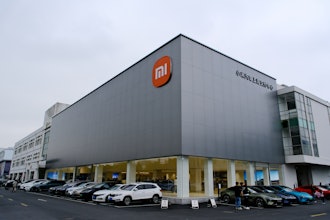KEY QUESTIONS:
How can I be sure to get a measurable
return on my integration?
P4
What does field service software do that
CRM does not?
P2
What is the difference between
synchronous and asynchronous
integration? When should I use
each one?
P3
WHY AND HOW TO INTEGRATE
IFS FIELD SERVICE MANAGEMENT ™
WITH POPULAR CRM SOFTWARE
IFS WHITE PAPER
Andrew Lichey, Product Manager, IFS
2 WHY AND HOW TO INTEGRATE IFS FIELD SERVICE MANAGEMENT WITH POPULAR CRM SOFTWARE
Ideally, both field service
software and CRM are
integrated with ERP to
avoid duplicate data and
data entry, to avoid costly
mistakes due to lack of
data and to share customer
information in real time,
improving the customer
experience.
WHY AND HOW TO
INTEGRATE IFS FIELD
SERVICE MANAGEMENT
WITH POPULAR CRM
SOFTWARE
BY ANDREW LICHEY, PRODUCT MANAGER, IFS
Field service management software and customer relationship management (CRM)
are best-of-breed solutions—software separate from enterprise resource planning
(ERP) software that goes deeper into specific business processes than ERP does by
itself.
Ideally, both field service software and CRM are integrated with ERP to avoid
duplicate data and data entry, to avoid costly mistakes due to lack of data and to
share customer information in real time, improving the customer experience. In many
cases, field service management software should also be integrated with CRM
because both use customer information. This ensures a customer’s needs and
expectations can be addressed regardless of whether they are interacting with a CRM
user, a field service technician or someone else in the service organization. That is
why IFS has created standard integration methodologies with ERP products, and have
packaged integrations with popular CRM packages including Salesforce and Microsoft
Dynamics 365 for Field Service.
While CRM is designed to manage the customer experience, a powerful field service
management software package like IFS Field Service Management™ (IFS FSM) goes
deeper into areas of software functionality that ensure customers can be served
profitably and successfully in the field, including:
• Dispatch and service scheduling including appointment setting, calendar-
based scheduling based on a maintenance plan and automated scheduling
optimization
• The ability to issue and record completion of work orders
• Contract management to ensure service agreements are adhered to, even
when terms are customer-specific
• Service inventory, including inventory on each technician truck
• Warranty management so technicians in the field can determine which
work is covered by warranty and which carries an additional charge
• Tools to enable technicians to upsell new services, issue quotes and
secure approval on quotes
3 WHY AND HOW TO INTEGRATE IFS FIELD SERVICE MANAGEMENT WITH POPULAR CRM SOFTWARE
…If a sales representative
can see in CRM what
service has been done to a
customer’s equipment in the
field, they can record a sales
opporunity to potentially
replace the equipment
and make that business
case to the
customer…
• Reverse logistics to take parts and subcomponents back into inventory
and repair or scrap them, as necessary, while tracking ownership of the
part and whether the customer or a subcontractor is entitled to a
replacement
• Service billing, which is usually used to collect details of billable service
and pass it to ERP for invoicing and to provide customers visibility into
billing activity from the field
Even when a CRM package has rudimentary field service capabilities, it cannot
enable a company to deliver some or all of these functions, as well as, competitors if
those competitors have a more technologically progressive service organization. But
even when the most advanced field service software product is run as a standalone
entity, there will be holes in the ability to address the entire customer lifecycle to
maximize revenue, satisfaction and retention.
360 DEGREE VIEW OF THE CUSTOMER
How does this combined view of the customer across both CRM and field service
improve customer service and increase revenue? Well, if a sales representative can
see in CRM what service has been done to a customer’s equipment in the field, they
can record a sales opportunity to potentially replace the equipment and make that
business case to the customer, on the basis of frequency of service, cost of service
and parts and perhaps predictive analytics.
A field service technician may learn the customer site they are at will be expanding,
and can create a sales opportunity for additional equipment that might be sold. A
company delivers better experience when, regardless of whether a customer deals
with the service organization or the sales organization, their contact knows about
recent conversations, transactions, service calls, open issues, customer-specific
requirements and correspondence.
Specific information that should be subject to a bidirectional integration include:
• Service history should be visible to CRM so sales and customer service
personnel can understand the facts on the ground at the customer
• Ongoing sales activity so a technician in the field, when they arrive on site,
understands the 360 degree view of the customer
• Sales history information can also give a field service technician visibility
into products or equipment at a customer site that may not yet be covered
by a service agreement as they may represent additional revenue
opportunities
• Warranty information from field service management provides CRM users
a better idea of warranty renewal sales opportunities with each customer
• Contract management information from field service will give CRM users
an idea of how well the company is performing against contractual
requirements
4 WHY AND HOW TO INTEGRATE IFS FIELD SERVICE MANAGEMENT WITH POPULAR CRM SOFTWARE
In order to avoid the
expense and risk associated
with some enterprise
software integrations,
IFS has used its integration
architecture—IFS Connect—
to create standard, but
configurable, integrations to
both Microsoft Dynamics
365 for CRM and Salesforce
Sales Cloud.
• Current sales promotions so field technicians can see opportunities that
are relevant to the customer and use that to upsell or give appropriate
discounts
HOW WE DO IT
In order to avoid the expense and risk associated with some enterprise software
integrations, IFS has used its integration architecture—IFS Connect—to create
standard, but configurable, integrations to both Microsoft Dynamics 365 for CRM and
Salesforce Sales Cloud. No two implementations of either of these CRM products is
truly the same, which means that each integration will be somewhat unique. That
is why the integration, like IFS FSM itself, is configurable. The end user customer
can use a drag-and-drop tool to add fields, repurpose fields and add tables. The
integration framework expands to include these fields and tables with no custom
programming.
This streamlined approach to integration also increases enterprise agility. As the way
you do business changes and those changes are reflected in Salesforce, Microsoft
Dynamics 365 for CRM or in IFS FSM, the integration can change with you without
custom programming or external consulting fees.
DECISIONS TO MAKE
In planning your integration, there are a few decisions to make about how you want to
handle transactions as they are passed between systems. Some fields are typically
integrated synchronously, which means before a transaction against the field is
recorded in one system, it must be confirmed by, and recorded in, the other. Others
are handled asynchronously, which means the transaction is recorded in one of the
two systems immediately without any acknowledgement that it has been received and
approved by the other system.
Some fields are typically handled synchronously, including:
• Quotes and estimates, which need to tie back to current pricing in CRM or
ERP
• Inventory commitments, to ensure available-to-promise status of parts
• Credit approvals, which need to be checked against payment history and
credit limits in CRM or ERP
Asynchronous integration is typically used to make the full customer list from CRM
available in field service. This is valuable to a field service technician so they can see
all contacts at a company and have an idea of their role in the organization. The
service history can also be made available in a periodic update to CRM to keep
customer service and sales people informed of the nature of the total service
relationship.
5 WHY AND HOW TO INTEGRATE IFS FIELD SERVICE MANAGEMENT WITH POPULAR CRM SOFTWARE
It is critical for the various
software products you rely
on to share data where it
makes sense. But don’t look
at integration as something
that must be done without a
sound business
case.
DO YOU REALLY NEED AN INTEGRATION?
It is critical for the various software products you rely on to share data where it makes
sense. But don’t look at integration as something that must be done without a sound
business case. And in identifying that business case, ask yourself these questions:
• What do we want this integration to enable us to do differently?
• What value can we place on customer satisfaction? How could we improve
the customer experience by increasing the customer insights available to
our field staff?
• How could customer insight in the field help your technicians sell more
products or services?
• What disconnects between sales and services result in tasks or processes
falling between chairs? What is the financial upside to eliminating these
problems?
• Are your customers telling your service people things that you wish were
passed onto your sales people? What increase in sales opportunities or
improved service could you expect from closing this communication gap?
• How could you increase the success of sales promotions or sales by
enlisting the help of field service technicians that interact directly with
customers?
• How successful are you in respecting customer-specific pricing, service
level agreements or unique requirements? How could improving visibility of
specific customer requests improve service?
CONCLUSION
Field service management software should not be an island unto itself. It should
extend other enterprise software including CRM and ERP. Integrations can increase
solution expense and complexity, so standard integrations that easily accommodate
your unique solution set are extremely valuable. And make sure to identify a few
problems you want to fix, so you can reap the rewards of a high-quality enterprise
solution.
IFS Product Manager Andrew Lichey is responsible for developing and evolving
the IFS Field Service Management software product. He has been leading field
service management software development projects since 1996. Prior to that,
he served as an intelligence analyst for the U.S. Army. He holds a degree in
computer science from the University of Wisconsin-Milwaukee.
E
n6
0
1
5
-1
P
ro
du
ct
io
n:
I
FS
C
or
p
or
at
e
M
ar
ke
ti
ng
,
M
ar
ch
2
0
1
8
.
IFSworld.com
COPYRIGHT © 2018 INDUSTRIAL AND FINANCIAL SYSTEMS, IFS AB. IFS AND ALL IFS PRODUCTS AND SERVICES
NAMES ARE TRADEMARKS OF IFS. ALL RIGHTS RESERVED. THIS DOCUMENT MAY CONTAIN STATEMENTS OF
POSSIBLE FUTURE FUNCTIONALIT Y FOR IFS’S PRODUCTS AND TECHNOLOGY. SUCH STATEMENTS ARE FOR
INFORMATION PURPOSES ONLY AND SHOULD NOT BE INTERPRETED AS ANY COMMITMENT OR REPRESENTATION.
THE NAMES OF ACTUAL COMPANIES AND PRODUCTS MENTIONED HEREIN MAY BE THE TRADEMARKS OF THEIR
RESPECTIVE OWNERS.
IFS AB ©2018
IFS develops and delivers enterprise software for customers
around the world who manufacture and distribute goods, maintain
assets, and manage service-focused operations. The industry
expertise of our people and solutions, together with commitment
to our customers, has made us a recognized leader and the
most recommended supplier in our sector. Our team of 3,500
employees supports more than one million users worldwide from
a network of local offices and through our growing ecosystem
of partners.
For more information about IFS, visit IFSworld.com
AMERICAS. . . . . . . . . . . . . . . . . . . . . . . . . . . . . . . . . . . . . . . . . . . . . . . . . . . . . . . . . . . . . . . . . . +1 888 437 4968
ARGENTINA, BRAZIL, CANADA, ECUADOR, MEXICO, UNITED STATES
ASIA PACIFIC . . . . . . . . . . . . . . . . . . . . . . . . . . . . . . . . . . . . . . . . . . . . . . . . . . . . . . . . . . . . . . +65 63 33 33 00
AUSTRALIA, INDONESIA, JAPAN, MALAYSIA, NEW ZEALAND, PHILIPPINES,
PR CHINA, SINGAPORE, THAILAND
EUROPE EAST AND CENTRAL ASIA . . . . . . . . . . . . . . . . . . . . . . . . . . . . . . . . . . . . . +48 22 577 45 00
BALKANS, CZECH REPUBLIC, GEORGIA, HUNGARY, ISRAEL, KAZAKHSTAN,
POLAND, RUSSIA AND CIS, SLOVAKIA, TURKEY, UKRAINE
EUROPE CENTRAL . . . . . . . . . . . . . . . . . . . . . . . . . . . . . . . . . . . . . . . . . . . . . . . . . . . . . . . . . +49 9131 77 340
AUSTRIA, BELGIUM, GERMANY, ITALY, NETHERLANDS, SWITZERLAND
EUROPE WEST . . . . . . . . . . . . . . . . . . . . . . . . . . . . . . . . . . . . . . . . . . . . . . . . . . . . . . . . . . . +44 1494 428 900
FRANCE, IRELAND, PORTUGAL, SPAIN, UNITED KINGDOM
MIDDLE EAST AND AFRICA . . . . . . . . . . . . . . . . . . . . . . . . . . . . . . . . . . . . . . . . . . . . . . . .+971 4390 0888
INDIA, SOUTH AFRICA, SRI LANKA, UNITED ARAB EMIRATES
SCANDINAVIA . . . . . . . . . . . . . . . . . . . . . . . . . . . . . . . . . . . . . . . . . . . . . . . . . . . . . . . . . . . . . .+46 13 460 4000
DENMARK, NORWAY, SWEDEN
FINLAND AND THE BALTIC AREA. . . . . . . . . . . . . . . . . . . . . . . . . . . . . . . . . . . . . . . +358 102 17 9300
ESTONIA, FINLAND, LATVIA, LITHUANIA
ABOUT IFS
Why and how to integrate IFS Field Service Management software with popular CRM software
Usually, field service management (FSM) software should be integrated with customer relationship management (CRM) because both use customer information. This ensures a customer’s needs and expectations can be addressed regardless of whether they are interacting with a CRM user, a field service technician or someone else in the service organization.
Latest in Home






















